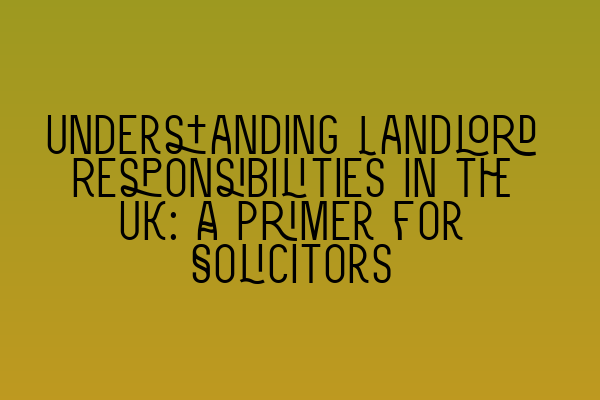Understanding Landlord Responsibilities in the UK: A Primer for Solicitors
As a solicitor specializing in property law, it is crucial to have a comprehensive understanding of landlord responsibilities in the UK. By having a firm grasp of these responsibilities, you can provide proper guidance and advice to your clients, whether they are landlords or tenants. In this blog post, we will delve deep into the topic, exploring key responsibilities and legal obligations that landlords must adhere to.
1. Ensuring Health and Safety Compliance
One of the primary responsibilities of a landlord is to ensure that their rental property is safe and meets all health and safety regulations. This includes providing a safe environment for tenants and ensuring that utilities such as gas and electrical systems are regularly inspected and maintained. Additionally, landlords must also ensure that the property meets fire safety standards and that necessary precautions such as smoke alarms and fire extinguishers are in place.
2. Repairs and Maintenance
Landlords have an obligation to maintain their rental properties in a good state of repair. This includes addressing any issues brought to their attention by tenants promptly. It is important to note that landlords have a legal duty to ensure that the property is fit for habitation and free from hazards. Regular inspections can help identify potential maintenance issues, allowing landlords to address them before they become major problems.
3. Protecting Tenancy Deposits
Under the UK law, landlords are required to protect their tenants’ deposits in a government-approved Tenancy Deposit Scheme (TDS). Failure to do so can result in severe penalties. It is essential for solicitors to educate their clients about the legal obligations related to tenancy deposits and guide them through the process of properly protecting and returning the deposit at the end of the tenancy.
4. Providing Proper Documentation
Solicitors must emphasize the importance of providing proper documentation to their landlord clients. This includes drafting and executing comprehensive tenancy agreements that outline the rights and responsibilities of both parties. Detailed inventories and schedules of condition should also be prepared to avoid any disputes at the end of the tenancy. Solicitors can play a crucial role in ensuring that all necessary documents are prepared accurately and legally.
5. Complying with Eviction Procedures
In cases where eviction becomes necessary, solicitors must guide their landlord clients through the proper legal procedures. It is crucial to ensure that eviction attempts are carried out within the confines of the law to protect the rights of both parties. Solicitors can assist with serving notices, filing court proceedings, and representing landlords in eviction hearings if required.
6. Keeping Up with Changing Regulations
The field of property law is ever-evolving, with new regulations and legislation constantly being introduced. Solicitors must stay updated with these changes to provide accurate advice to their clients. Subscribing to newsletters and attending seminars or webinars focused on landlord responsibilities can help solicitors stay informed and offer reliable guidance to landlords.
Conclusion
Understanding landlord responsibilities is paramount for solicitors practicing property law in the UK. By effectively advising their clients on these obligations, solicitors can help landlords maintain legal compliance, minimize disputes, and create a positive and safe environment for tenants. By focusing on health and safety compliance, repairs and maintenance, deposit protection, documentation, eviction procedures, and staying updated with changing regulations, solicitors can successfully navigate the complexities of landlord responsibilities.
Are you a solicitor looking to enhance your knowledge and skills in property law and land law? SQE Property Law & Land Law offers comprehensive preparation courses for the SRA Solicitors Qualifying Examination (SQE) 1 and SQE 2. Our courses cover key topics, including landlord responsibilities, ensuring you are well-equipped to provide exceptional legal services to your clients. Check out our SQE 1 Practice Exam Questions and SQE 2 Preparation Courses for more information on our offerings. Stay ahead of the curve with SQE Property Law & Land Law and excel in your legal career.
For more information about SQE exam dates, check out our article on SRA SQE Exam Dates.
[Image Source: Unsplash]
Note: This blog post is for informational purposes only and should not be considered legal advice. It is always recommended to consult with a qualified solicitor for specific legal advice related to landlord responsibilities in the UK.
